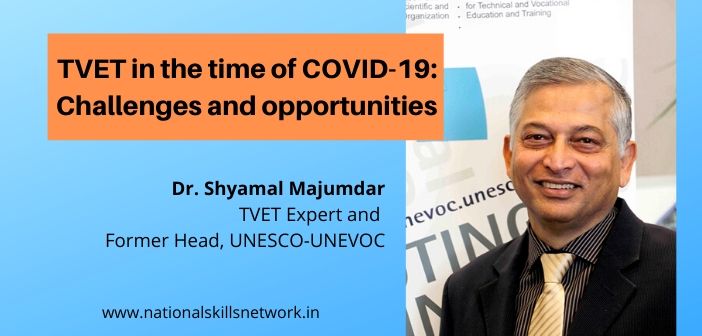COVID-19, the global health pandemic, has disrupted our lives in ways we could have never imagined! It has interrupted learning and vocational training programs all over the world. To reflect upon the challenges and opportunities of Technical and Vocational Education and Training (TVET) in the time of COVID-19, Dr. Shyamal Majumdar, TVET Expert, and Former Head UNESCO-UNEVOC, has come up with a reflective paper titled – “Technical Vocational Education & Training –
reflections on the issues facing TVET and its potential in the time of COVID-19”. The paper intends to throw light on how the educational system and TVET should respond to the challenges brought by a global pandemic.
In this Skill Talk, Dr. Majumdar captures the larger context of the paper; we present you the excerpts:
 In the present circumstances, when normal training is not possible, how TVET institutions should respond to the crisis
In the present circumstances, when normal training is not possible, how TVET institutions should respond to the crisis
We are facing an unprecedented crisis all around the world. It is one of the biggest crises, according to some experts. Governments are deploying strategies and approaches that they have not implemented before to overcome the crisis. Under the circumstances, TVET cannot be silent spectators. Many TVET institutions are also coming with out-of-box responses. TVET situation needs immediate attention and I was contemplating on the issues TVET is facing, along with potential opportunities during the time of COVID-19. In my paper, I propose a framework to explore responses to these challenges in three categories:
- Immediate – An immediate response would mean finding alternatives to continue learning, using technology (online learning) to address the disruption in the training process, use of infrastructure for storing PPE (Personal Protective Equipment) and raise awareness campaign on public health and safety measures to mitigate the outbreak of the virus. Some of the TVET institutions have started making masks, ventilators, sanitizers, tool kits, etc. Institutions in India too have responded with innovation. They are coming up with various solutions including a low-cost ventilating machine for multiple users.
- Mid-term – Mid-term response involves focusing on measures that could be taken by TVET institutions for any post-pandemic disturbances. It could be disturbances in the labor market, reskilling and upskilling of the migrant workers, and introducing multi skill vocational programs to the workforce in the area of public utility services and livelihood programs. Repositioning of flexible work-based learning is needed, as there is going to be a new normal. We must find out community-based solutions for this, like the telemedicine and VET for public health management. The role of telemedicine is long-term and plays a tremendous role. Many schools and training institutions can open medical kiosks to serve the poor and disadvantages. TVET can support the development of specific competencies of the local youth to meet the needs of local jobs of setting up and running these kiosks. These kiosks can also provide a one-time service, provide a database that uses Artificial Intelligence to track the community spread, etc. VET for pandemic risk management, supporting renewable energy, water, sanitation hygiene, and food security services will play an important role.
- Long-term – The COVID-19 crisis has raised a very fundamental concept regarding the way we work, live, consume, and enable development. In the last century, we have done tremendous progress, but it was primarily in terms of economic dimension. We largely ignored the social and environmental dimensions of these developments and we are paying the price for it. Henceforth, there is an urgency to integrate biodiversity, climatic change, social justice, inclusive development, peace education, sustainable development, and global citizenship principles in the TVET curriculum. These are the key issues we have not given enough thought. We all know the mission of sustainable development goals, but how much have we worked towards it? Knowledge, skill, and attitude to implement SDGs will play a very important role. To facilitate this transformation, we need a smooth implementation of Greening TVET principles.
Click here to download the paper – https://nationalskillsnetwork.in/wp-content/uploads/2020/05/FINAL-COVID19_Shymal-Majumdar.pdf
Some recommendations to ponder when planning and governing TVET
- Transforming TVET for sustainable development should be the central agenda for future TVET work
- Pandemic situation and their impact should be included in planning TVET approach and risk management
- Capacity development of TVET teachers and all stakeholders need to be strengthened on handling pandemic situation
- TVET for public health management and hygiene needs to be strengthened with respect to healthy practices covering health, sanitation, and public utility services.
- Capacity building of all TVET stakeholders is needed on developing online education and blended learning.
- Learners should be provided with the learner-centered, autonomous tools to learn on their own
- Entrepreneurial learning is the way forward for local economic development.
- As opportunity dictates, TVET institutions can be leading examples to implement greening approaches
Challenges of technology adoption in TVET programs
When we talk about impacting society and communities, we need to change our mindset towards technology. This is not about only hi-tech such as Industry 4.0 or Artificial Intelligence. It is much bigger!
Related Article: PSSCIVE UNESCO UNEVOC TVET Conference 2020: Notes from a talk by Dr. Shyamal Majumdar – Read More: https://nationalskillsnetwork.in/psscive-unesco-unevoc-tvet-conference-2020-notes-from-a-talk-by-dr-shyamal-majumdar/
In the changed discourse, technology has to be used meaningfully in transforming people’s lives. Students have great potential to learn through appropriate technology – enabled environments, and learning by doing. Adoption of technology might be a critical issue, especially in the rural and semi-urban areas. But if we can ignite the inner strength of the learners to respond to the situations, that would be wonderful. Technology adoption is more at the mindset level and we have to take it to the grassroots level, inspire them, and then support them with incubation and innovation.
Top 4 industries for which vocational training program will be in a great demand due to the pandemic:
- Healthcare: Handling public healthcare would be a priority. TVET for public health care management, multi skills vocational program for public utility services, handling pandemic situations, and telemedicine which would need a lot of skilling.
- Green Jobs: Green jobs and sustainable development experts will be of high demand. How to handle biodiversity, sustainable development in every occupation needs new skills. Renewable energy, sustainable production and consumption, food security, circular economy experts, and green audit.
- Service sector: Orientation will be changed and a new normal will come. New hygiene norms, security, and safety norms will be in place. These would require reskilling for the existing workforce and proper training for the new entrants.
- Agricultural sectors: TVET skills for agricultural activities will be renewed focus. Integrating science and technology in agriculture and natural products, organic farming, application of Industry 4.0 in agricultural sectors will be of high interest and demand














Thanks for sharing the great insight and thoughts on the challenges and opportunities of ITI in India’s Technical and Vocational Education and Training (TVET) system. Certainly pandemic is compelling us, pushing us to work on new applicable and suitable strategies to which tends vocational training more practical and demand driven.
Regards.